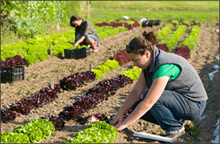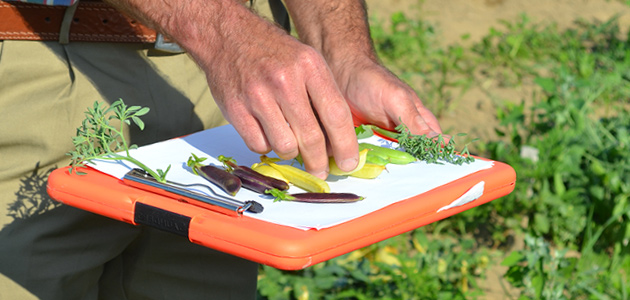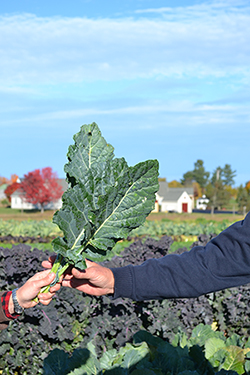- Johnny's Research Farm | Breeding, Trialing, Selection & Quality Assurance
- Johnny’s OP Stewardship Project: Restoration of ‘Hungarian Hot Wax’ Pepper
- Open-Pollinated Revival Project: 3 Improved OP Heirloom & Heritage Tomatoes
- A Brief History of Tool Development at Johnny's | Planting the Seed of a Small-Scale Farming Revolution
- Classical Plant Breeding at Johnny's | by Rob Johnston, Jr, Plant Breeder (Retired) & Founder of Johnny's Selected Seeds
- 5 JSS-Bred Varieties Introduced by Rob Johnston, Jr., Plant Breeder & Founder (Retired), Johnny's Selected Seeds
- 3 for 2020: New Johnny-Bred Stories by Rob Johnston, Jr. | ‘Starry Night,’ ‘Citrine’ & ‘Pipsqueak’
- Classical Plant Breeding at Johnny's Selected Seeds | Infographic
- About Johnny's Variety Trialing Program
- Seed Variety Trialing – Why Try Something New?
- Seed Variety Trialing at Johnny's Selected Seeds | Infographic
- How to Conduct a Scale-Appropriate Trial on Your Own Farm
- All-America Selections Award-Winning Varieties Bred by Johnny's | Spec Sheet
- Varieties Bred by Johnny's | 4-pp Brochure
- About Johnny's | PDF
- Johnny's Announces 'Rhubarb Supreme' | New Bolt-Resistant Strain of a Favorite, Open-Pollinated Swiss Chard | Press Release
- Johnny's Corno di Toro Peppers Rule | Press Release
- Pea Selection at Johnny's | The Story of 'Sugar Ann' Snap Pea
- The Johnny's Advantage | PDF
- Video: Classical Plant Breeding at Johnny's
- Video: 'Cherry Bomb' | JSS-Bred Organic Cherry x Grape Tomato from Johnny's
- Video: Johnny's Trialing Program
- Video: Hand-Pollinating Peppers at Our Research Farm | Classical Plant Breeding at Johnny's Selected Seeds
- Video: 'Clementine' | The Tangerine-Colored, Organic Cocktail Tomato from Johnny's Breeding Team
- Johnny’s Selected Seeds Observes 50th Anniversary | Press Release
- Johnny's Welcomes Kevin L Cook, PhD as VP of R&D | Press Release
- Restoration of OP 'Hungarian Hot Wax' Pepper | Exclusively from Johnny's Selected Seeds
- Farm Tours of Johnny's Research & Trialing Farm
How to Conduct a Successful Variety Trial at Your Farm
A Concise Guide from Johnny's Trialing Team
Choosing which varieties to grow is one of the most important aspects of farming. Crops can offer dozens, even hundreds of varieties, each with its own advantages and disadvantages. At Johnny's Research Farm, we trial thousands of varieties each year so that we can offer you the best products and information.
To help you conduct successful trials at your own farm, Johnny's Trialing Team has drawn up a set of instructions on creating trials that give you dependable information. Use this concise guide to get started.
Planning Your Variety Trial
Think about what you want to learn from the trial.
Are you looking to replace a specific variety? Do you need a variety for a certain market or customer? Or, are you trying to get an idea of how your favorite varieties compare to up-and-coming ones?
Include one or more familiar, or "control" varieties for your trial.
It is important to grow controls that you know alongside new varieties. This allows you to compare the characteristics of the new varieties side by side with your standard varieties.
Choose an appropriate plant population for each crop.
For fruiting crops, we suggest a minimum of six plants of each variety; for leafy and root crops, at least six to ten feet of row. Larger plantings lessen the effects of soil differences, and more plants to work with can give you a better feel for varietal differences.
Plan for enough space.
Ideally, the entire trial will be planted in one contiguous block of the greenhouse or field. Avoid planting in separate fields, if possible.
Planting Your Variety Trial
Label each variety clearly by name or number.
At our farm, we label varieties by number, so that we are not influenced by any personal prejudice for or against specific varieties. For large trials, drawing up a diagram of the planting is helpful in the event of lost labels. Small-farm record-keeping software can be very helpful in keeping track of your trials.
Treat all varieties equally.
Plant on the same day, and be sure to use the same watering/fertilizing schedule for the entire trial across the varieties you are comparing.
Evaluating Your Variety Trial
Establish the traits that you will evaluate.
Each crop differs, but some of the important criteria we evaluate include flavor, appearance, uniformity, yield, disease resistance, and maturity date.

Aim to evaluate each variety at its peak.
Different varieties will commonly mature within different time periods, so check the trial frequently to determine peak evaluation time for each one.
Draw conclusions.
Your field notes are only as useful as your conclusions. It's not always easy to draw definitive conclusions from a single replication, though. You may find it desirable to repeat the trial on different sites in different years, so you can see how varieties perform under varied conditions. That said, these steps may not all be practical for a lot of small farms — we encourage you to take on what you can manage and learn what you can from your efforts.
Contact Us About Your Trial Results
We are always happy to hear from our growers. Send us an email, letter, or fax; visit us on social media; or call your Territory Sales Representative if you're a commercial customer. Let us know which varieties work best for you — and why!
Learn More
Learn more about trialing new crop varieties from the following resources.
- Why Try Something New? Reasons for trying out new varieties; how best to choose new products to suit your changing needs; and points to consider as you adopt new varieties on your farm.
- Johnny's Trialing Program — How We Trial New Varieties Each Year. An overview of the 7 key steps in our Trialing Program.
- Learn More about advanced and replicated variety trialing programs for organic crops by visiting the website of the Organic Seed Alliance.
- Browse all products New This Year.
About Johnny's Trialing Program



